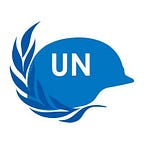Women, Peace and Security
By Charlotte Morgan and Isabelle Truong
This year marked the 20th anniversary of the adoption of the landmark Security Council resolution 1325, the first one to recognize women as key agents of peace. According to UN Secretary-General António Guterres, the ground-breaking resolution “underscored the link between gender, inequality and fragility, and between women’s security and international security.”
To commemorate the landmark anniversary, UN Secretary-General António Guterres made a rallying call to peacekeeping partners to summon political will and recommit to the Women, Peace and Security agenda.
At a roundtable, the Secretary-General met virtually with four women leaders from Mali, Central African Republic, Darfur and Cyprus, who spoke about their work to advance women’s full, equal and meaningful participation in peace processes, conflict resolution and politics. Meet the women leaders:
Bintou Fouané Samaké
Civil society activist and recently appointed Minister of Women, Children and Family Affairs in Mali, Bintou Fouané Samaké, called for the establishment of formal and informal measures to ensure women’s participation in the country’s Peace and Reconciliation Agreement. Further, she noted that the Government formed on 5 October consists of only 16% women, adding that “the inclusion of women in public service remains a challenge,” despite a 2015 law that sets a 30% quota.
Lina Ekomo
Lina Ekomo started her work on strengthening women’s participation in political governance in 2013.
Now, Lina leads the Network for Women’s Leadership in Central Africa (RELEFCA). She drew attention to the upcoming December elections to stress the importance of women’s participation in sustaining peace and stability in the country. Thanks to women’s organizations’ efforts, with support from the UN Mission and its partners, nearly half of registered voters in the country are women. She further stressed the importance of ensuring that women’s participation in the peace process is truly meaningful and called upon the UN and international community for support.
Magda Zenon
Magda Zenon is a Cypriot peace and human rights activist and an active member of the local civil society, focusing on the inclusion of Cypriot women in overall peace processes.
Magda hosts conversations with inspiring women as the host of ‘kaleidHERscope’, an online radio programme where she speaks about peacebuilding, gender-based violence and women’s participation in decision-making.
Through her work with the ‘Hands Across the Divide’ organization, Magda helps bring together Greek and Turkish Cypriot communities from each side of the ceasefire line and promote the integration of gender equality provisions in the Cyprus peace process. The human rights activist expressed concern about “the continued failure of the local peace negotiations and the absence of women at the highest levels, as well as a gender perspective at the negotiating table.”
Nawal Hassan Osman
Nawal Hassan Osman’s experience in human rights, peacebuilding and gender equality work spans almost four decades. Since 2014, she serves as advisor on the situation in the Darfur region and the intra-states borders.
As a member of the Darfur Women’s Platform, Nawal contributed to the consolidation of the Darfur Women’s Position Paper on peace and security, which was presented at the Juba peace talks. The Platform’s advocacy efforts resulted in women being appointed in local governments in the states of Darfur.
Nawal also highlighted the critical role of the 54 women protection networks established in collaboration with the AU-UN Mission in Darfur, working as “early warning mechanisms, identifying protection risks and providing security forces with this information, as well as supporting survivors of sexual and gender-based violence with referral pathways.”
“Women under siege”
As the world continues to battle the COVID-19 pandemic, women are under siege, bearing the bulk of the care and economic burden in many societies, while also facing an alarming surge of violence in the home.
And the pandemic has in turn impacted local capacity to respond to and support victims of such violence. Nawal Hassan Osman noted that “the restrictions on people’s movement impede survivors’ access to essential services, including security, protection, and sexual and reproductive health services, and hamper their ability to seek justice.” Posing a direct threat to accountability, “the pandemic has prevented law enforcement officials from investigating incidents of sexual violence and judicial authorities to hear cases,” she asserted.
In Cyprus, lockdowns and closure of border crossings imposed by the Coronavirus mitigation measures have hampered dialogue and communication efforts between the Cypriot and Turkish Cypriot communities on the island, said Magda Zenon, who added that domestic violence has also increased as a result of the pandemic. Despite this, the ‘Hands Across the Divide’ network has continued their bi-communal trust-building efforts online.
Despite COVID-19, women have continued to play critical peacebuilding roles while also responding to the pandemic. The Darfur Women Platform, for example, led response efforts, both on advancing the Secretary-General’s call for a global ceasefire and on sexual and gender-based violence, raising awareness of the impact of COVID-19 on the Women, Peace and Security agenda. In the Central African Republic, women called on the signatories of the Political Agreement to support the ceasefire and make it a reality by the end of the year.
While multiple gains have been made to strengthen women’s participation over the years, much more remains to be done. The fight for women’s full, equal and meaningful participation in peace and political processes continues.
Charlotte Morgan and Isabelle Truong are interns in the Strategic Communications Section of UN Peacekeeping.
